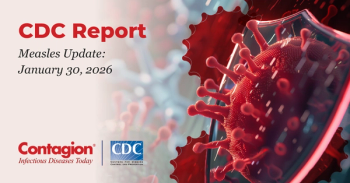
After Mild Infection, Children Retain Long-Term COVID-19 Immunity
At 12 months after COVID-19 infection, anti-SARS-CoV-2 spike receptor-binding domain IgG persisted in all age groups.
As the Omicron variant continues to mutate and cause unprecedented rates of infection in children, it is critical to understand their long-term immunity after contracting COVID-19. In adults, it is known that COVID-19 antibodies may persist as long as 12 months after infection. One
The single-center, prospective cohort study enrolled 252 COVID-19 family clusters from April 1, 2020-August 31, 2021. Included families were 4 or more weeks after infection, had children younger than 15 years, and at least 1 family member with a history of COVID-19. As this study was analyzing only “natural immunity,” vaccinated families were excluded.
The investigators collected blood samples from all patients, analyze the immunologic response to COVID-19 with quantified anti–spike receptor-binding domain (S-RBD) IgG using chemiluminescent immunoassay. All patients with positive COVID-19 serologic tests at their enrollment were followed up for longitudinal clinical and serological evaluation. Demographic characteristics, medical history, and vaccination status data were also collected.
Families were identified via the University Hospital of Padua’s COVID-19 Family Cluster Follow-Up Clinic, and underwent serologic screenings at 1-4 months, 5-10 months, and 10-18 months after infection. Follow-up was halted if patients received any COVID-19 vaccine of had negative serologic test results. The data were anonymized and entered into a web-based database, using the Vanderbilt University Research Electronic Data Capture (REDCap) platform.
Of the 902 study participants (from 252 family clusters), 697 had a confirmed COVID-19 infection. This included 351 children, who averaged 8.6 years of age, and 346 parents, who averaged 42.5 years of age. A total of 96.7% (n = 674) of the COVID-19 infections were asymptomatic or mild.
The investigators found that anti-SARS-CoV-2 spike receptor-binding domain IgG persisted for 12 months after COVID-19 infection in all age groups. Notably, younger children had significantly higher antibody peaks at every follow-up point in time. Specifically, children younger than 3 years were found to develop levels of binding antibodies 5-fold higher than adults older than 18 years.
These results are significant for clinicians and for parents looking to best protect their children against COVID-19. mRNA COVID-19 vaccinations are
Newsletter
Stay ahead of emerging infectious disease threats with expert insights and breaking research. Subscribe now to get updates delivered straight to your inbox.
































































































































